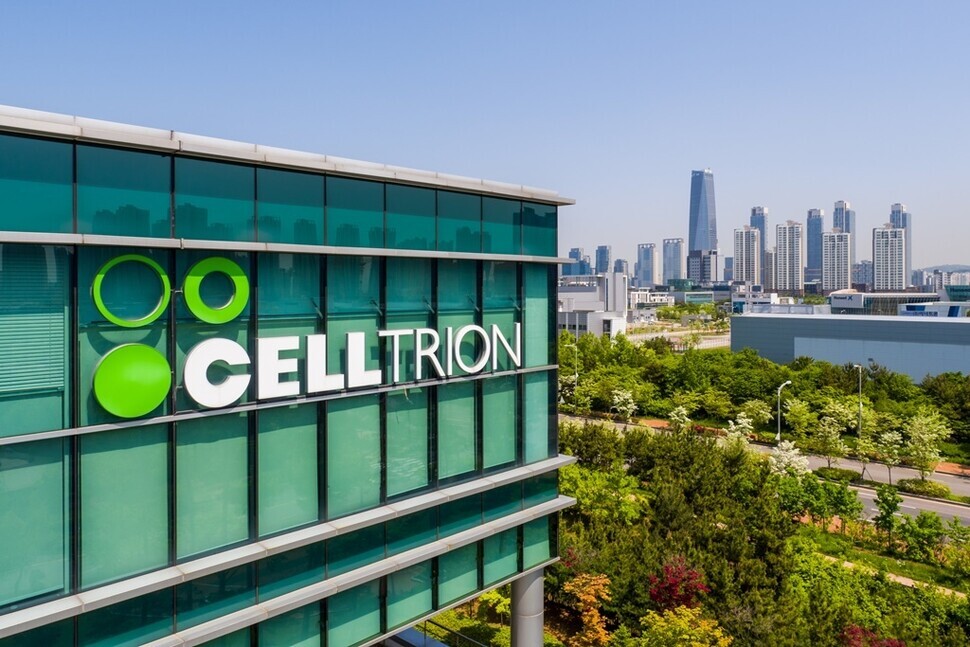hankyoreh
Links to other country sites 다른 나라 사이트 링크
Celltrion’s COVID-19 treatment proves effective in reducing symptoms, says MFDS advisory panel

An advisory panel examining the safety and effectiveness of COVID-19 vaccines and treatments said its review of Celltrion’s antibody treatment Regkirona showed results in reducing the recovery time for patients with symptoms. The panel recommended that the Ministry of Food and Drug Safety (MFDS) grant approval, contingent on performance in Phase 3 clinical trials.
On Jan. 18, the MFDS announced results from a meeting the day before by the advisory panel examining the effectiveness and safety of COVID-19 treatments and vaccines. The advisory panel meeting is part of an MFDS procedure for consulting experts on clinical, non-clinical, and quality-related areas ahead of consultation sessions with the Central Pharmaceutical Affairs Council (CPAC).
According to the MFDS, the panel tested the effectiveness of Regkirona by administering it to patients who presented with one or more of seven COVID-19 symptoms to a severe or moderate degree, including fever. Others were given a placebo. It then measured the time elapsed before symptoms weakened or disappeared entirely. The study showed that patients given Regkirona took an average of 5.34 days to recover from their COVID-19 symptoms, compared with an average of 8.77 days for those given a placebo, or 3.43 days faster.
“The advisory panel concluded that the decrease in time needed for COVID-19 symptoms to improve through administration of this treatment was statistically significant, and therefore a clinically significant result,” explained Kim Sang-bong, director of the MFDS biopharmaceuticals and herbal medicine bureau.
To test safety, the panel also observed any irregularities and side effects that occurred within 28 days of Regkirona administration, the frequency of reactions associated with the methods of administration, and the types and severity of symptoms. The results showed cases of hypertriglyceridemia and hypercalcemia after administration, which the panel said were predictable symptoms seen in Phase 1 trials. Other side effects were generally mild to moderate and occurred in similar proportions among those receiving the treatment and placebo, with no irregularities serious enough to be life-threatening, the panel added.
In terms of time taken for COVID-19 patients to test negative, the panel said no significant difference was observed between patients who received and did not receive the treatment. At the same time, its opinion noted a tendency for virus concentrations in the body to drop after Regkirona administration. The treatment’s effect on mortality rates could not be verified, as there were no deaths in either the treatment or placebo group.
Based on its overall findings, the panel advised approving the treatment contingent on the performance of Phase 3 clinical trials. It also suggested three preconditions: establishing a significant decrease in the disease progressing from mild/moderate to severe symptoms among patients in Phase 3 trials, setting concrete guidelines for clinical use based on separate discussions with relevant institutions, and conducting separate clinical trials combining the treatment with previous treatments for severe symptoms and other immunomodulators for patients requiring supplemental oxygen.
“The MFDS is reviewing the data, including the advisory panel’s recommendations, and plans to use the overall findings for consultation sessions with the Central Pharmaceutical Affairs Council on safety, effectiveness, and MFDS approval,” Kim Sang-bong said.
By Suh Hye-mi, staff reporter
Please direct comments or questions to [english@hani.co.kr]

Editorial・opinion
![[Editorial] Intensifying US-China rivalry means Seoul must address uncertainty with Beijing sooner than later [Editorial] Intensifying US-China rivalry means Seoul must address uncertainty with Beijing sooner than later](https://flexible.img.hani.co.kr/flexible/normal/500/300/imgdb/original/2024/0517/8117159322045222.jpg) [Editorial] Intensifying US-China rivalry means Seoul must address uncertainty with Beijing sooner than later
[Editorial] Intensifying US-China rivalry means Seoul must address uncertainty with Beijing sooner than later![[Column] When ‘fairness’ means hate and violence [Column] When ‘fairness’ means hate and violence](https://flexible.img.hani.co.kr/flexible/normal/500/300/imgdb/original/2024/0516/7417158465908824.jpg) [Column] When ‘fairness’ means hate and violence
[Column] When ‘fairness’ means hate and violence- [Editorial] Yoon must stop abusing authority to shield himself from investigation
- [Column] US troop withdrawal from Korea could be the Acheson Line all over
- [Column] How to win back readers who’ve turned to YouTube for news
- [Column] Welcome to the president’s pity party
- [Editorial] Korea must respond firmly to Japan’s attempt to usurp Line
- [Editorial] Transfers of prosecutors investigating Korea’s first lady send chilling message
- [Column] Will Seoul’s ties with Moscow really recover on their own?
- [Column] Samsung’s ‘lost decade’ and Lee Jae-yong’s mismatched chopsticks
Most viewed articles
- 1[Editorial] Transfers of prosecutors investigating Korea’s first lady send chilling message
- 2S. Korea “monitoring developments” after report of secret Chinese police station in Seoul
- 3[Exclusive] Unearthed memo suggests Gwangju Uprising missing may have been cremated
- 4[Editorial] Intensifying US-China rivalry means Seoul must address uncertainty with Beijing sooner t
- 5China, Russia put foot down on US moves in Asia, ratchet up solidarity with N. Korea
- 6Xi, Putin ‘oppose acts of military intimidation’ against N. Korea by US in joint statement
- 7Truth commission confirms Korean War killings by soldiers and police
- 8[Editorial] South Korean women are mobilizing in unprecedented ways
- 9Calls for gender-equality continue as demonstrations target President Moon
- 10[Column] “Hoesik” as ritual of hierarchical obedience